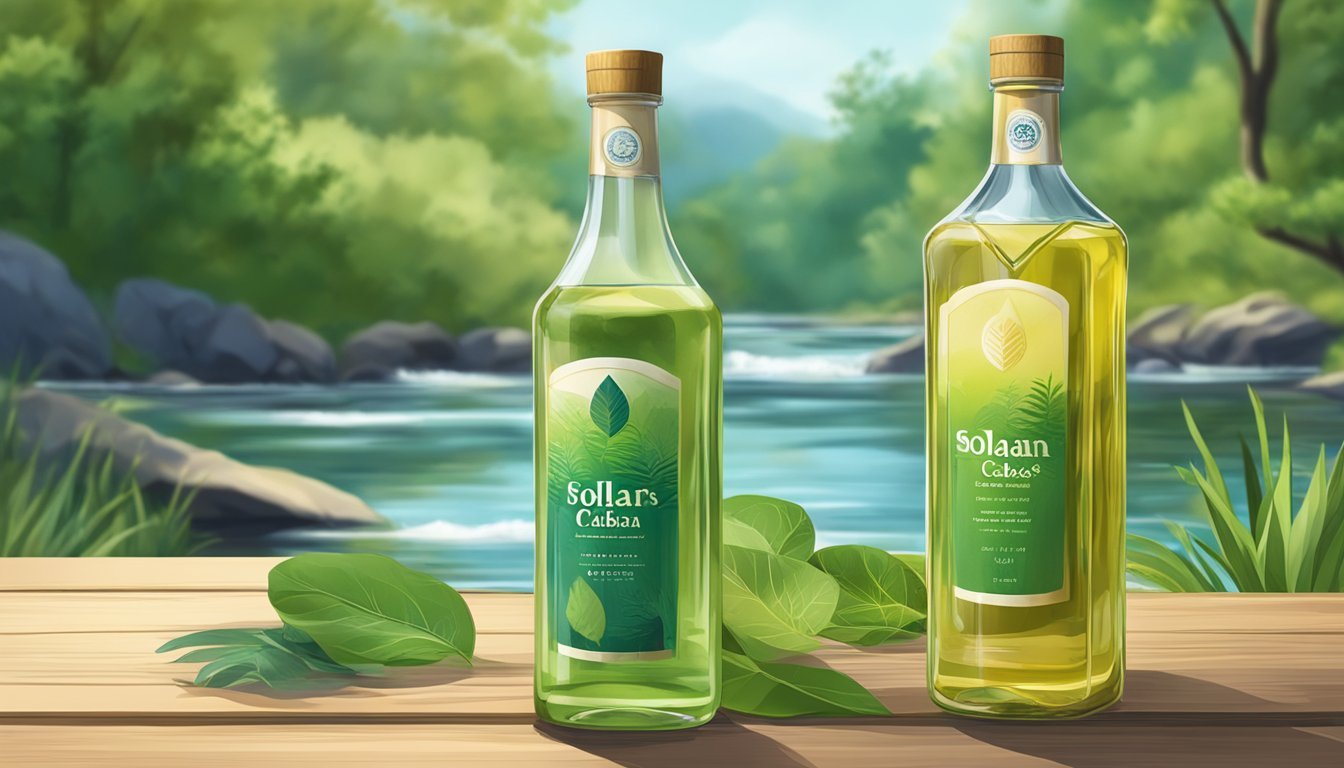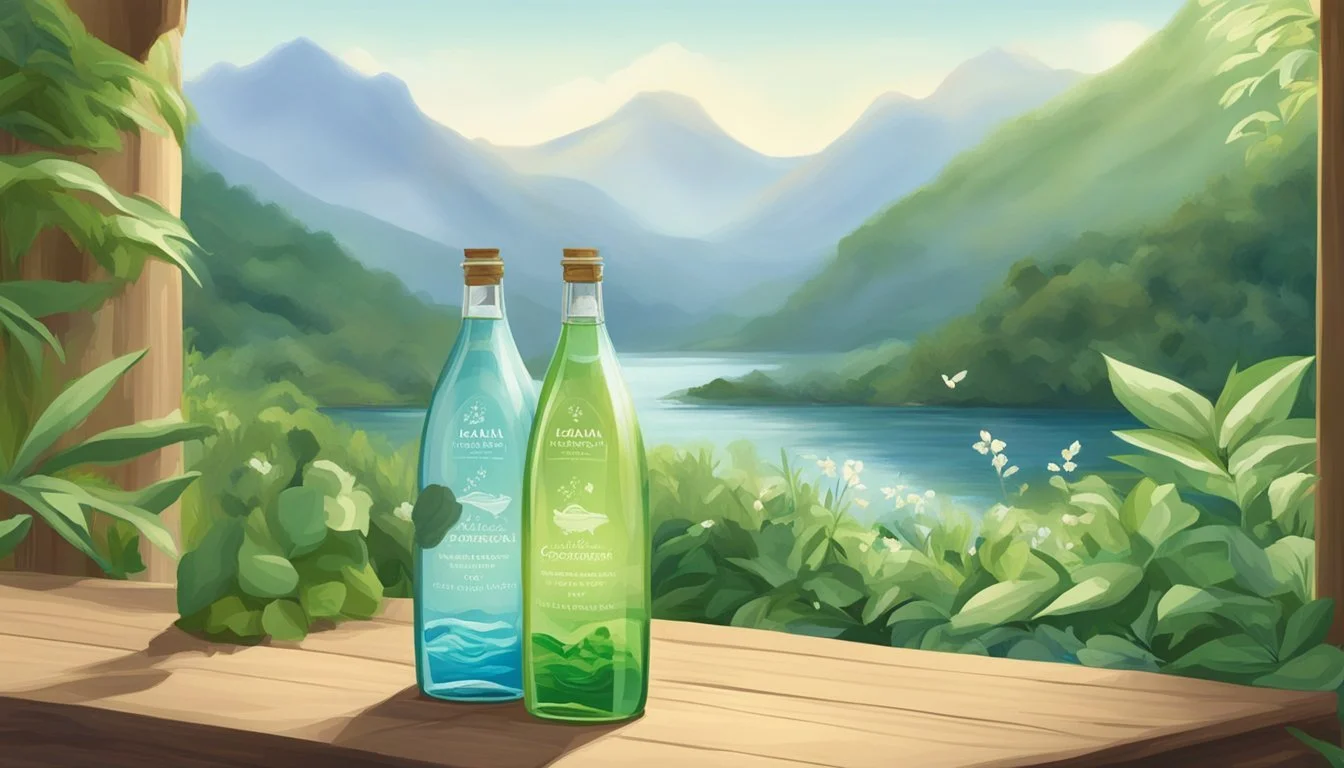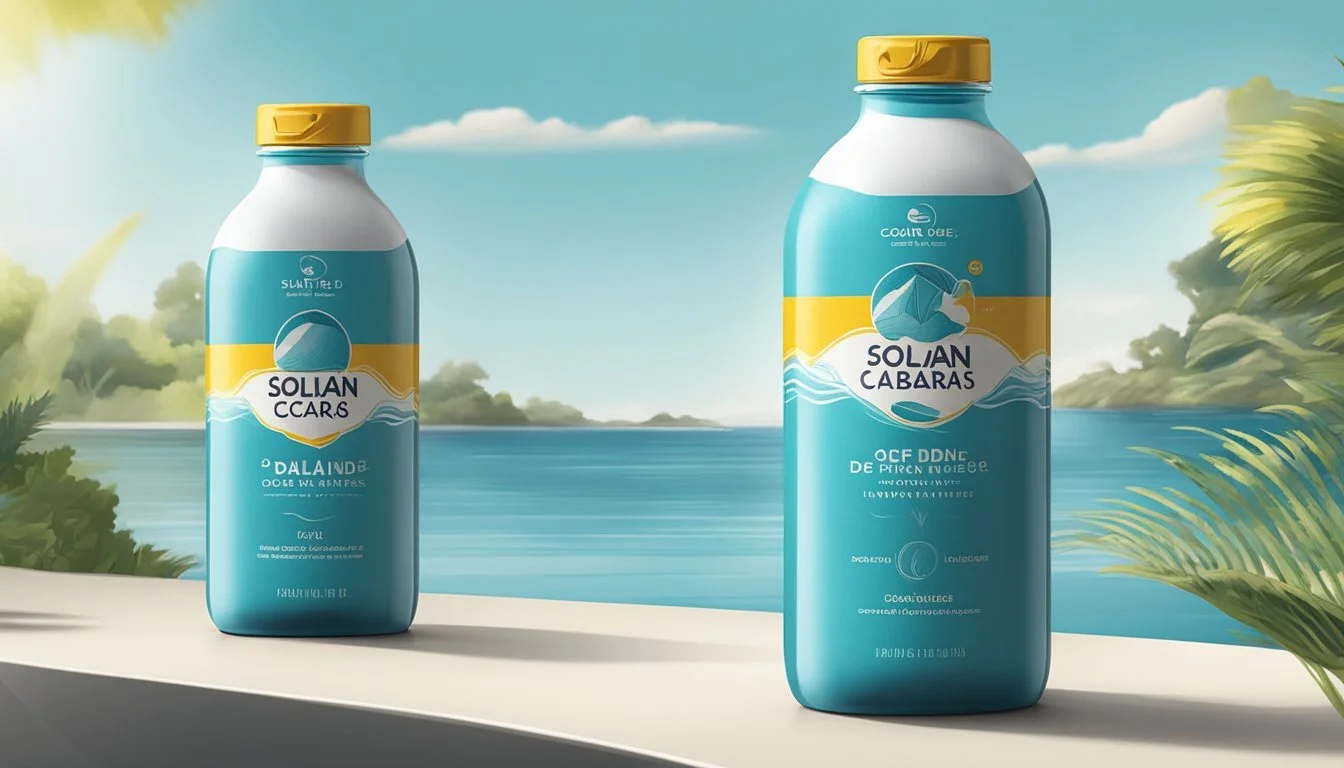Solán de Cabras vs. Open Water
Which Bottled Water is Better?
When it comes to premium bottled water, Solán de Cabras and Open Water are two brands that often come up in discussions. Each offers something unique, from heritage to practicality. Solán de Cabras, hailing from the pristine springs of Serranía de Cuenca in Spain, boasts a rich history spanning over 3,600 years and is revered for its pure taste and distinctive mineral composition. Its iconic blue glass bottle also adds a touch of elegance, setting it apart on shelves and in dining setup
On the other hand, Open Water stands out with its modern approach to sustainability. Packaged in recyclable aluminum bottles, it appeals to environmentally conscious consumers who prioritize reducing their plastic footprint. The water itself is crisp, pure, and offers a refreshing experience that many find comparable to more traditional bottled waters, with the added benefit of eco-friendliness.
Choosing between Solán de Cabras and Open Water ultimately depends on whether you value heritage and taste or sustainability and packaging. Both offer high-quality hydration but cater to slightly different priorities, making them standout choices in the crowded market of bottled water.
Understanding Bottled Water
Bottled water varies greatly in terms of source, treatment, and environmental impact. This section explores the nature of mineral water, industry regulations, and the environmental implications associated with bottled water consumption.
Defining Mineral Water
Mineral water is defined by its origin and composition. It is sourced from natural springs, which gives it a unique mineral content. Unlike tap water, mineral water's composition remains unaltered, preserving its natural qualities.
In the USA, mineral water must contain no less than 250 parts per million (ppm) of total dissolved solids. The WHO guidelines emphasize the importance of purity and quality, noting that mineral water should be free from contaminants and pathogens, ensuring it is safe for consumption.
Bottled Water Regulations
Bottled water is heavily regulated to maintain quality and health standards. In the USA, the Food and Drug Administration (FDA) sets stringent guidelines for bottled water companies. These regulations cover everything from source protection to bottling processes.
Countries in the European Union also have strict regulations for natural mineral water, including regular testing and certification. Compliance with such guidelines ensures that bottled water remains safe, pure, and consistent in quality.
Environmental Impact
The environmental impact of bottled water is significant. PET plastic bottles are widely used, contributing to plastic waste and pollution. Although efforts are made to use environmentally friendly materials, the overall carbon footprint from production, transportation, and disposal remains high.
Recycling programs and the use of eco-friendly packaging are critical but not widespread. Consumers are encouraged to consider these factors when choosing bottled water, as the environmental consequences of bottled water consumption can be substantial.
Brand Histories and Origins
Solán de Cabras brings a rich Spanish history and unique origin, while Open Water offers a modern, environmentally-friendly alternative.
Solán de Cabras: A Spanish Legacy
Solán de Cabras, originating from Spain, has a history that dates back centuries. The water is sourced from a natural spring located in the Serranía de Cuenca Mountains, specifically near the town of Beteta.
This location has been prized for its purity since Roman times, with the aquifer providing consistent, high-quality water. The blue glass bottle, introduced in 2006, symbolizes the brand's commitment to authenticity and sustainability.
Nestled in the Solán de Cabras Nature Preserve, the spring's untouched environment supports the brand's reputation for premium purity.
Open Water: American Innovation
Open Water, based in the USA, is known for its environmentally conscious approach to bottled water. Launched with a mission to reduce plastic waste, it uses aluminum bottles and cans, which are more recyclable than traditional plastic.
This innovation reflects a growing demand for sustainable practices in the beverage industry.
The company sources its water from natural springs and focuses on maintaining a minimal carbon footprint. By partnering with organizations dedicated to ocean conservation, Open Water has set high standards for environmental responsibility, making it a top choice for eco-conscious consumers.
Exploring Source and Composition
Understanding the source and mineral composition of bottled waters like Solán de Cabras and Open Water helps determine their quality and unique characteristics. This section delves into the natural springs and aquifers from which these waters originate, and analyzes their mineral content.
Natural Springs and Aquifers
Solán de Cabras originates from a unique spring in the Serranía de Cuenca mountains, where it undergoes a 3,600-year natural filtration process. The aquifer in this region ensures the water is untouched by human intervention, contributing to its purity. This historic spring has been known since Roman times.
Open Water, sourced from various sustainable aquifers in the United States, focuses on sustainability by ensuring these sources are responsibly managed. Like Solán de Cabras, these aquifers provide natural spring water that is free from contaminants and naturally filtered over extended periods.
Mineral Content Analysis
The mineral composition of Solán de Cabras is rich in essential minerals, making it unique. It contains magnesium, calcium, and bicarbonate, contributing to its reputed healing properties and smooth taste. This distinct combination supports overall well-being.
Open Water features a balanced mineral profile with essential elements such as potassium, sodium, and calcium. These minerals enhance hydration and provide a crisp, refreshing taste without excessive mineral concentrations. The meticulous mineral content ensures the water meets high standards of purity and health benefits.P
Mineral Solán de Cabras (mg/L) Open Water (mg/L) Calcium ~60 ~50 Magnesium ~25 ~15 Sodium ~9 ~20 Potassium ~1 ~3 Bicarbonate ~180 ~120
This detailed analysis shows how each water's source contributes to its unique mineral composition and health benefits.
Health and Consumption
When comparing Solán de Cabras and Open Water, key health factors like hydration, mineral content, and suitability for special diets should be considered. These elements impact the overall health and wellness of the consumers.
Hydration and Wellness
Solán de Cabras and Open Water both provide excellent hydration benefits, essential for maintaining overall health and well-being.
Solán de Cabras comes from a natural spring in Spain, offering a smooth taste that many consumers find refreshing. Its balanced mineral composition may help with better absorption and hydration, contributing to general wellness.
On the other hand, Open Water is known for its high purity levels and minimal taste. Its focus is on providing a clean and straightforward hydration experience, devoid of contaminants.
Assessing Mineral Benefits
Solán de Cabras contains a balanced ratio of calcium and magnesium, essential for bone health and muscle function. The mineral content can aid in daily wellness activities, supporting an active lifestyle.
Open Water, while low in minerals, emphasizes purity and safety. It offers a simple hydration option for those who prefer fewer minerals. This can be suitable for individuals with specific dietary needs who require control over their mineral intake.
Special Diets Consideration
For individuals on low-sodium diets, Solán de Cabras presents an excellent option due to its low sodium content. This makes it a safer choice for those managing hypertension or cardiovascular conditions.
Pregnant women and babies, who need carefully controlled mineral intake, may benefit more from Solán de Cabras' balanced mineral composition. Open Water’s low mineral content means it won't contribute significantly to dietary requirements, making it less ideal for those needing specific nutritional support.
Tasting Notes and Preferences
Solán de Cabras and Open Water offer distinct tasting experiences essential for discerning consumers. Factors like flavor profile, mineral content, and the expertise of a water sommelier play significant roles in these preferences.
Flavor Profile and Palate
Solán de Cabras is known for its mineral-rich, slightly alkaline flavor. This makes it appealing to those who appreciate a unique, rich palate. The mineral content contributes to a slightly bitter aftertaste, considered pleasant by enthusiasts.
Open Water, in contrast, offers a more neutral flavor. Its balanced structure and low mineral content ensure a smoother experience. This water appeals to those who prefer a subtler taste without any pronounced bitterness or acidity.
The Role of a Water Sommelier
A Water Sommelier provides expert insights on bottled water. Their role is to discern subtle differences in water quality and taste. They can identify the nuanced flavors and mineral compositions that distinguish Solán de Cabras from Open Water.
Solán de Cabras would be highlighted for its purity and historical relevance, while Open Water might be chosen for sustainable packaging and a cleaner taste profile, enhancing digestion. Their assessments guide consumers in selecting the right water for different occasions, ensuring a refined drinking experience.
Packaging and Accessibility
When evaluating Solán de Cabras and Open Water, examining the packaging and accessibility gives insight into practicality and environmental impact.
Bottle Design and Material
Solán de Cabras features an iconic blue glass bottle known for its premium look and protection against light. This ensures that the water’s taste and properties remain unaltered, making it a favored choice for reserve occasions. The glass material is fully recyclable but heavier and less portable.
Open Water opts for aluminum bottles and cans, aiming for an environmentally friendly approach. Aluminum is infinitely recyclable and lightweight, providing a more convenient and eco-conscious option suitable for both everyday use and travel. This commitment to sustainability sets it apart in reducing plastic waste.
Retail Presence and Availability
Solán de Cabras is distributed across select stores and high-end shops, reflecting its premium market positioning. Availability can be limited, often requiring specific orders or shopping at niche retailers. This brand’s presence in boutique stores and online platforms enhances its exclusive image.
Open Water is widely available in both supermarkets and health stores, with a strong online presence for easy purchasing. Their focus on accessibility means consumers can find and purchase products conveniently, increasing their market reach. The brand benefits from partnerships with various stores, making it easier to integrate into daily routines.
Comparative Analysis
Solán de Cabras and Open Water stand out in the premium bottled water market for their quality and purity. Their mineral composition and consumer preferences offer a clear picture of their respective strengths.
Purity and Quality Contests
Solán de Cabras boasts a history of purity, originating from a spring discovered by the Romans. The water is known for its unique mineral composition, filtered through centuries without human interference. Nestlé’s involvement in the water industry underscores the significance of maintaining high quality standards, directly affecting consumer health and trust.
Open Water emphasizes sustainability. With eco-friendly packaging, they target environmentally conscious consumers. Their purification process ensures high standards, albeit with a focus less on historical purity and more on modern quality controls. Coca-Cola’s influence in the market highlights the importance of branding and quality in consumer choices.
Market Performance and Consumer Preference
Solán de Cabras has built a loyal consumer base, partly due to its historical reputation and the premium aspect of its blue glass bottle. This brand is often associated with luxury due to its price point, which appeals to a niche market. Its healing claims, cherished since the 15th century, resonate with those seeking health benefits.
Open Water appeals to the eco-conscious segment, emphasizing sustainability and reducing plastic waste. This brand has carved a space in the market by addressing environmental concerns, making it popular among younger, environmentally aware consumers. Although it might not have the historical allure of Solán de Cabras, its modern approach positions it as a strong competitor.
Innovations and Future Trends
The bottled water industry has been evolving rapidly, with both Solán de Cabras and Open Water making notable strides in innovation. Key areas of focus include sustainable practices and the expansion of product lines.
Sustainable Practices
Both brands are committed to environmentally friendly initiatives. Open Water, known for its zero-plastic packaging, uses aluminum bottles that are recyclable. This approach reduces plastic waste and offers a sustainable alternative.
Solán de Cabras employs natural filtration methods, ensuring water purity while maintaining ecological balance. Their long history of sustainable practices includes packaging improvements and energy-efficient bottling processes.
To further this commitment, both companies participate in environmental events and campaigns. This not only drives positive change but also educates consumers on the importance of sustainability in bottled water production.
Expanding Product Lines
Both brands are diversifying their offerings to meet consumer demands. Solán de Cabras has ventured into sparkling natural mineral water and fruit juice blends, enhancing the drink experience with varied flavors. These new additions cater to health-conscious consumers looking for nutritious and refreshing options.
Open Water, while primarily focused on still water, is exploring flavored waters and other innovative beverage combinations. This expansion seeks to provide more choices within the bottled water market, appealing to a broader audience.
By continually introducing new products, both companies stay competitive and relevant in an ever-changing market. These efforts underscore their commitment to innovation and consumer satisfaction, setting a standard for the industry.
Closing Remarks
When considering Solán de Cabras and Open Water, one must look at multiple factors. Solán de Cabras is known for its rich mineral composition derived from centuries-old filtration. This provides a distinct taste and potential wellness benefits.
On the other hand, Open Water stands out for its focus on sustainability. The brand uses recyclable aluminum cans, making it an eco-friendly choice for consumers.
Electrolytes play an essential role in hydration. Solán de Cabras boasts naturally occurring minerals, enhancing its electrolyte content. This could be beneficial for those needing extra hydration support, such as athletes.
Comparing the benefits of each, Solán de Cabras offers a unique taste and historical prestige. Meanwhile, Open Water appeals to those prioritizing environmental impact without compromising hydration quality.
Water brands like these cater to different preferences. Solán de Cabras may attract those valuing tradition and mineral purity. Open Water might appeal more to eco-conscious consumers seeking sustainable hydration solutions.
Ultimately, both brands provide high-quality bottled water with their own distinct advantages. Choosing between them depends on individual priorities, whether it’s wellness, sustainability, or taste.








